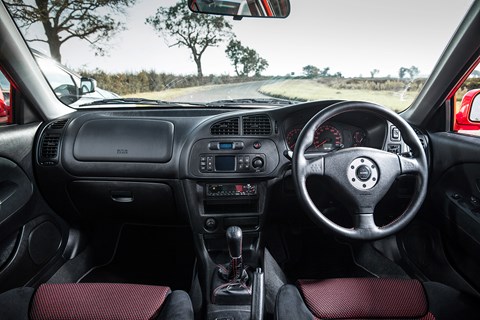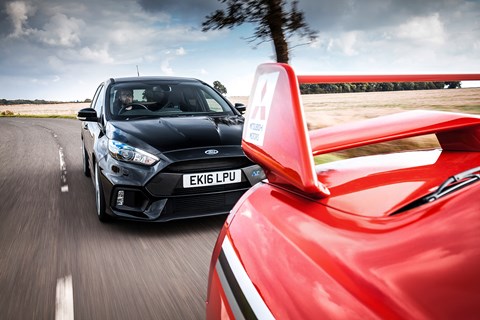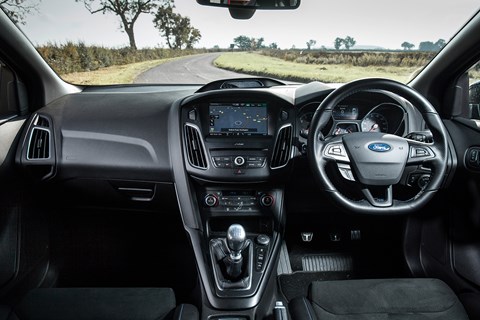► Which is the better buy?
► New Focus RS or used Evo VI?
► Digital dexterity or raw analogue?
The Ford Focus RS is at the vanguard of a new breed of four-wheel-drive turbocharged performance cars. With a computer-controlled drive system so clever it can seemingly pre-empt the driver’s every wish, it’s a hot-hatch game-changer.
Rewind a decade or two and rally-inspired four-door supercar killers were taking over the world for the first time, as the Lancer/Impreza wars reached their zenith. Can the PlayStation 1 generation still deliver thrills to drag our attention away from Ford’s digitally enhanced wunderkind?

The Mitsubishi Evo VI Tommi Makinen Edition (TME)
This isn’t any old Evo we’ve brought along, but one of the breed’s high watermarks. In 1999, mumbling Finnish rally hero Tommi Mäkinen won his fourth back-to-back WRC title, and Mitsubishi launched an eponymous Evo VI edition to celebrate. An upgraded, more responsive turbo, 10mm lower suspension stiffened by an upper front strut brace, faster steering rack, different exhaust, new ECU, beefed-up transfer case internals: a long list of tiny tweaks adding up to a faster, harder whole. Resplendent in fag-packet colours with Colgate-white Enkei wheels, it looks every inch the rally icon.
By contrast, the spoiler-clad Focus RS looks almost demure, but within the first few feet all the modern-era Fast Ford touch-points are evident: an abrupt clutch, rubbish turning circle, one-inch punch gearshift action and steering pointier than Seb Vettel’s index finger. The 2.3-litre four-pot sounds more like a five, with a burbly (artificially enhanced) note and a flurry of artillery flak from the exhaust with every gear change. Ride is uncompromising even with the dampers in the softer of their two settings (the firmest is for track use only), and there’s a huge swell of torque to lean on from low revs. It’s a very fast car.
An agile one, too. Mitsubishi’s memorably named ‘Active Yaw Control’ (AYC) can shuffle the proportion of torque between the Evo’s front and rear differentials, but the Ford’s twin clutch packs bookending its rear drive unit can divvy twist side-to-side, too. The result is that the Focus mostly feels like a rear-wheel-drive car with an awful lot of grip, and a playful one at that. The Evo, meanwhile, is a resolutely 4wd experience, and for me, it’s an even more enjoyable one than the riotous Focus.

If endlessly configurable driving modes are inherent to the Focus’s appeal, then a refreshing lack of them is the Mitsubishi’s. No configurable modes for the dampers, steering or Bloody Touchscreen, just five closely spaced gears, four dials and a naff head unit. Perfect. There’s great visibility past its thin pillars and short dash (composed of typically dreary ’90s-era plastics). The steering’s surprisingly light, but full of feel, the brakes less grabby than the over-servoed Focus, and the seats better positioned – the Ford’s are a foot too high.
Its 2.0-litre four sounds underwhelming after the Focus, a hairdryer-esque whir with a turbo whoosh that rises and falls like cupping a seashell to your ear. Said turbo has more pronounced lag than the Ford’s, but the Mäkinen still feels quick with a capital ‘F’. You notice the 200kg lighter(!) kerbweight in its response to all of your inputs, and the old (special) stager’s actually a tenth quicker to 62mph. Officially the TME produced 276bhp to meet domestic performance restrictions, but it’s whispered that even the standard Evo VI had 300bhp.
In long corners you can feel the AYC sending torque to where it’s needed most, and whatever the weather the Evo feels light on its feet and adjustable, on suspension that seems tailor-made for British B-roads. Together with that spoiler hulking in the mirror, goosebumps are guaranteed.

Servicing & running costs
Mitsubishi Evos are infamous for service intervals that last about as long as the average mayfly. The Evo VI will require an oil and filter change every 4500 miles, along with fresh oil for the rear diff. Keeping the AYC system in fine fettle is important: its components need fresh oil every two years, or more frequently if you’re planning any track outings. Replace the cambelt every four years or 40,000 miles.
The Focus RS is on a rather more palatable 12,500-mile service plan, although replacement 19-inch Michelins don’t come cheap, especially the optional stickier Cup 2s. Officially the Ford averages 36.7mpg to the Mitsubishi’s 23mpg, but we averaged 25.2mpg on the Ford’s trip computer.
Reliability
Most Evos aren’t as well cared for as this heritage fleet car. Mitsubishi’s Darren Hughes, who looks after it, suggests gearbox, brakes and rear diff performance are vital checkpoints on any Evo VI test drive. ‘Make sure the AYC is working correctly, without any noise,’ he warns. ‘A screeching noise when the system’s operating in bends can be a sign of slipping plates, or that the system needs bleeding.’
Gearbox bearings can become noisy and vibration through the brake pedal betrays warped discs, a common Evo VI bugbear. Make sure replacements are bedded in properly, and avoid resting your foot on the pedal after hard use. Where possible, allow the engine to warm up properly, and idle a while before shut-down.
‘Interior condition is important too,’ Hughes says. ‘Reconditioning is expensive and time-consuming, and many trim components aren’t available anymore.’
The Focus RS is still too new for any common issues to be widely reported, although we’ve heard tales of occasional electrical glitches. At any rate, it’s covered by a three-year/60,000-mile warranty from new, with extensions available.

Key options
The TME didn’t have to be red: plain white, black, silver and blue cars were also offered, but scarlet ones fitted with ‘Special Colouring Pack’ decals, like the car pictured here, are worth more. It’s not hard to see why. Official imports from Ralliart UK were SVA tested and individually numbered, with UK service books and calibrated speedos, unleaded-spec fuel restrictors, and cold-climate batteries and alternators. Most unofficial ‘grey’ imports lack the UK cars’ level of underbody sealing, and rust can be an issue.
As with all modern classics there’s huge market variation in price and condition, from low teens for hard-living examples to near £30k for concours-spec garage queens; ideally budget £20k+ for a good one. This one, signed by Tommi himself and on display in Mitsubishi HQ for some years with a mere 38 miles on the clock (it’s now on around 3900) is insured for six figures.
Prices are gradually on the rise, as are older Evo Vs and similar-era special-edition Imprezas such as the RB5 and P1, so now may be an opportune time to buy. Many Mäkinens are modified; finding an original-spec one is preferable, and not necessarily straightforward. Make sure it really is a genuine TME – there are clones out there, and the excellent Lancer register (lancerregister.com) can help you spot them.
The options list for the Focus RS is refreshingly short. We’d go for the lightweight forged alloys, nav system with rear camera, and the Luxury Pack, which adds rear parking sensors, power-fold mirrors and cruise control. Try the optional shellback Recaros before you shell out for them; an acquired taste.
Verdict
The Focus RS fully deserves all the hype that’s been lavished upon it. It’s huge fun, and offers remarkable performance for the money. Both the RS and the Evo’s development teams have made monsters of humble donor cars, but it’s the Lancer’s driving experience that stayed with me longer.
The TME occupies a sweet spot in performance car development where suspension and powertrain tech allowed exciting yet friendly handling, but avoided feeling synthetic or over-assisted. If you can find a good one, and live with the service intervals, old school rules.
Owners’ views
My Ford Focus RS – Ashleigh Morris
‘I’ve had my RS six months and covered 8000 miles. I use it every day, and often drive to Scotland from the Midlands. It’s quite expensive on fuel, but worth it for the amount of fun. It feels like a rally car: the level of grip has really surprised me. In fact, it feels faster than most actual rally cars I’ve been in [as driver or co-driver]. It’s well-equipped and doesn’t feel like it’s missing anything to save weight. I optioned reversing sensors and camera, but avoided the sports seats.’
My Mitsubishi Evo VI TME – Richard White
‘Having owned three Evo VIs and an Evo IX you could say I’m an Evoholic. The TME encapsulates the best aspects. The ride’s firm but not so harsh you bounce around, the exhaust is sporty without being intrusive, and the induction noise is perfect. Be warned that steering feel can be blunted by the wrong tyres. Cars like the TME will never be produced again. It’s a fantastic experience, one that a modern, over-sanitised equivalent simply can’t replicate.’
Specs
Ford Focus RS
Price new £31,250
Engine 2261cc 16v turbo 4-cyl, 345bhp @ 6000rpm, 324lb ft @ 2000-4500rpm (347lb ft on overboost)
Transmission Six-speed manual, all-wheel drive with torque-vectoring rear axle
Performance 4.7sec 0-62mph, 165mph, 36.7mpg, 175g/km CO2
Suspension MacPherson strut front, independent rear
Weight/made from 1599kg/steel
Length/width/height 4390/1823/1472mm
On sale 2016-on
Mitsubishi Lancer Evo VI Tommi Makinen Edition
Price new £32,995
Value now £13k-£30k
Engine 1997cc 16v turbo 4-cyl, 276bhp @ 6500rpm, 275lb ft @ 2750rpm
Transmission Five-speed manual, all-wheel drive
Performance 0-62mph 4.6sec, 150mph, 23mpg, n/a g/km CO2
Suspension MacPherson strut front with inverted dampers, multi-link rear with coil springs, anti-roll bars front and rear
Weight/made from 1365kg/steel
Length/width/height 4350/1770/1405mm
On sale 2000-2002